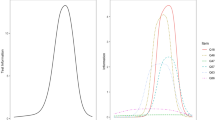Abstract
Objective
This pilot study explored students’ responses to feedback about their own and their peers’ depression symptoms. The study also examined how experiences with the normative feedback might vary according to academic exposure to depression-related topics.
Methods
For 9 weeks, female undergraduates (N = 73) completed a weekly web-based version of the 8-item Patient Health Questionnaire, which gauges depression symptom levels. Next, they participated in semi-structured face-to-face interviews where they responded to the personalized normative feedback. The interviews were transcribed, coded, and analyzed.
Results
Students responded favorably to the feedback and without notable distress. The feedback increased students’ awareness of their own depression symptoms and those of their peers. Those with higher academic exposure to depression-related topics were more likely to have accurate perceptions of their peers’ depression symptoms and were less likely to be surprised by information in the feedback than students with less exposure.
Conclusions
Personalized normative feedback for depression symptoms has potential as an effective tool for promoting more accurate views of personal and peer depression symptoms and reducing barriers to help-seeking. Students with less academic exposure to depression-related topics may benefit from increased knowledge of how to gauge their own depression symptoms and increased awareness of their peers’ symptoms. Further research is needed to more fully evaluate the effects of this feedback and to directly assess the effects of this feedback on help-seeking behaviors.

Similar content being viewed by others
References
American College Health Association. American College Health Association–National College Health Assessment II: Reference Group Executive Summary Fall 2012. Hanover: American College Health Association; 2013.
Zivin K, Eisenberg D, Gollust SE, et al. Persistence of mental health problems and needs in a college student population. Journal of Affective Disorders. 2009;117:180–5.
Gulliver A, Griffiths KM, Christensen H. Perceived barriers and facilitators to mental health help-seeking in young people: a systematic review. BioMed Central Psychiatry. 2010;113:1–9.
Eisenberg D, Hunt J, Speer N, et al. Mental health service utilization among college students in the United States. Journal of Nervous and Mental Disease. 2011;199:301–8.
Eisenberg D, Speer N, Hunt J. Attitudes and beliefs about treatment among college students with untreated mental health problems. Psychiatric Services. 2012;63:711–3.
Eisenberg D, Downs MF, Golberstein E, et al. Stigma and help seeking for mental health among college students. Medical Care Research and Review. 2009;66:522–41.
Eisenberg D, Hunt J, Speer N. Help seeking for mental health on college campuses: review of evidence and next steps for research and practice. Harvard Review of Psychiatry. 2012;20:222–32.
Downs MF, Eisenberg D. Help seeking and treatment use among suicidal college students. Journal of American College Health. 2012;60:104–14.
Hunt J, Eisenberg D. Mental health problems and help-seeking behavior among college students. Journal of Adolescent Health. 2010;46:3–10.
Kauer SD, Reid SC, Crooke AH, et al. Self-monitoring using mobile phones in the early stages of adolescent depression: randomized controlled trial. J Med Internet Res. 2012;25:e67.
Donker T, Griffiths KM, Cuijpers P, et al. Psychoeducation for depression, anxiety, and psychological distress: a meta-analysis. BMC Medicine. 2009;7:1741–7015.
Geisner IM, Neighbors C, Larimer ME. A randomized clinical trial of a brief, mailed intervention for symptoms of depression. J Consult Clin Psychol. 2006;74:393–9.
Carey KB, Borsari B, Carey MP, et al. Patterns and importance of self-other differences in college drinking norms. Psychology of Addictive Behaviors. 2006;20:385–93.
LaBrie JW, Hummer JF, Grant S, et al. Immediate reductions in misperceived social norms among high-risk college student groups. Addictive Behaviors. 2010;35:1094–101.
Berkowitz A. An overview of the social norms approach. In: Lederman L, Steward L, Goodhart F, Laitman L, editors. Changing the culture of college drinking: a socially situated health communication campaign. Hampton: Hampton; 2005. p. 193–214.
Lewis MH, Neighbors C, Geisner IM, et al. Examining the associations among severity of injunctive drinking norms, alcohol consumption, and alcohol-related negative consequences: the moderating roles of alcohol consumption and identity. Psychology of Addictive Behaviors. 2010;24:177–89.
Walters ST, Neighbors C. Feedback interventions for college alcohol misuse: what, why and for whom? Addictive Behaviors. 2005;30:1168–82.
Eisenberg D, Hunt J, Speer N. Mental health in American colleges and universities: variation across student subgroups and across campuses. The Journal of Nervous and Mental Disease. 2013;20:60–7.
Blanco C, Okuda M, Wright C, et al. Mental health of college students and their non-college-attending peers: results from the National Epidemiologic Study on Alcohol and Related Conditions. Archives of General Psychiatry. 2008;65:1429–73.
Lichtenstein G, McCormick AC, Sheppard SD, et al. Comparing the undergraduate experience of engineers to all other majors: significant differences are programmatic. Journal of Engineering Education. 2010;99:305–17.
Kroenke K, Strine TW, Spitzer RL, et al. The PHQ-8 as a measure of current depression in the general population. Journal of Affective Disorders. 2009;114:163–73.
Kroenke K, Spitzer RL, Williams JBW, et al. The Patient Health Questionnaire Somatic, Anxiety, and Depressive Symptoms Scales: a systematic review. General Hospital Psychiatry. 2010;32:345–59.
Dedoose. Website: http://www.dedoose.com. Accessed 15 Dec 2012.
Miles MB, Huberman AM, Saldana J. Qualitative data analysis: a methods sourcebook. Thousand Oaks: Sage Publications, Inc.; 2013.
Dewey ME. Coefficients of agreement. British Journal of Psychiatry. 1983;143:487–9.
Acknowledgments
This research was funded by Stanford University Undergraduate Advising and Research. We appreciate our participants and interviewers who helped make this study possible.
Disclosures
The authors have no conflicts of interest to disclose.
Author information
Authors and Affiliations
Corresponding author
Rights and permissions
About this article
Cite this article
Hom, M., Heaney, C. & Koopman, C. Personalized Normative Feedback for Depression Symptoms: a Qualitative Pilot Study of Female Undergraduates. Acad Psychiatry 38, 464–469 (2014). https://doi.org/10.1007/s40596-014-0076-0
Received:
Accepted:
Published:
Issue Date:
DOI: https://doi.org/10.1007/s40596-014-0076-0




